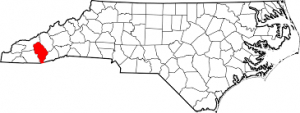
Location of Jackson County in Western North Carolina. This picture is in the public domain. Credit: David Bennbenik.
The issue of Cherokee citizenship came to the fore in the 1890s. A dispute over the ability of the EBCI to sell lumber rights to their land without Federal approval came before the Fourth Circuit Court of Appeals in 1897. David Boyd, who sought to purchase timber felled on EBCI land and the EBCI Council argued that the Cherokee were citizens of the North Carolina, and so able to make contracts and legal arrangements entirely on their own. The Federal government, seeking to protect its own privileges, argued in court that the EBCI were “wards” of the Federal government, and so required Federal approval before the sale of the timber rights under dispute. The Fourth Circuit ruled, in The United States v. D.L. Boyd, in favor of the Federal government. The Cherokee were “wards” and their North Carolina citizenship was definitively rejected. (Frizzell 212-213)
Very shortly after, in 1900, local election officials in Western North Carolina used the Court’s decision in Boyd to bar Eastern Band Cherokee from registering to vote. Since the Court had ruled that EBCI were not citizens of the state, local officials argued that it would be illegal for them to register and vote in elections. (Finger 97) In Jackson and Swain Counties, the reliably Republican Cherokee voters were often the deciding factor in what were regularly elections with very small margins. Indeed, in the wake of Boyd local papers celebrated the decision as a victory for the local Democratic Party. (Frizzell 213)
Not even military service would change minds of local officials.